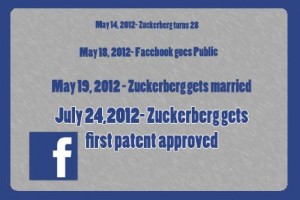 What a year it has been for Mark Zuckerberg! He celebrated his twenty eighth birthday, his company went public, getting married, and now his first patent.
What a year it has been for Mark Zuckerberg! He celebrated his twenty eighth birthday, his company went public, getting married, and now his first patent.
In 2006, Facebook CEO, Mark Zuckerberg applied for a patent application governing certain privacy settings has finally been approved by the U.S. Patent and Trademark Office. Zuckerburg and former Facebook chief privacy officer, Chris Kelly are credited as the inventors for the patent they created back in July of 2006.
For those who want to look it up, the patent number is 8,225,376 and is titled “Dynamically generating a privacy summary.” The description reads: “A system and method for dynamically generating a privacy summary is provided. The present invention provides a system and method for dynamically generating a privacy summary. A profile for a user is generated. One or more privacy setting selections are received from the user associated with the profile. The profile associated with the user is updated to incorporate the one or more privacy setting selections. A privacy summary is then generated for the profile based on the one or more privacy setting selections.”
The main concept that Zuckerberg is trying to protect is the profile based on privacy settings, how a profile is displayed on screen to a user or other users on the social network. This patent was originally rejected due to obvious claims in the patent. After Facebook became public, they requested several interviews and a reinvestigation into the application they reapplied for in February of this year. Well, if at first you don’t succeed; try, try and try again. That is exactly what Facebook did, and they are the now proud holders of their own patent.
Since this first patent had been filed, a handful of other patents that Facebook submitted have also been approved. Since the lawsuit with Yahoo, Zuckerberg has been applying for several defensive patents to get as many patents as he can. They are doing this in hopes that the more patents they hold, the harder it will be for other companies to file a lawsuit against them.
Sources:cnet.com,mashable, ReadWriteWeb
